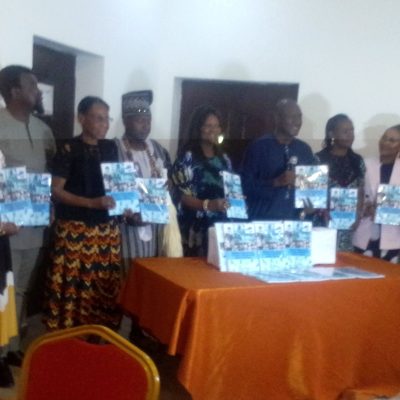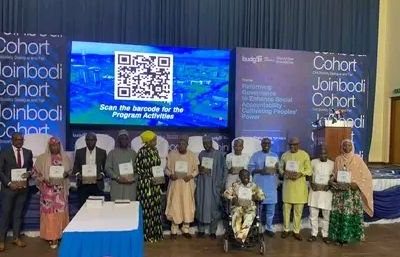PALACE OF PRIESTS ASSEMBLY ADMONISHES CHURCHES TO BRACE UP SERMONS ON CORRUPTION

The Project Director of Palace of Priests Assembly (PPA), Dr. Pastor Otive Igbuzor has said that historically the religious groups in Nigeria have been largely absent from the forefront of anti-corruption efforts.
He stated this at a one day close-out meeting for mobilizing Christians against corruption project supported by the MacArthur Foundation held today in Abuja
He pointed out that in recent years, there has been a notable shift from the religious groups, particularly among those working within the behavioural change in the Pentecostal churches to eliminate corruption by all means in their teaching, preaching and daily activities.
He said “Corruption is a pervasive and enduring challenge that transcends borders, cultures, and social classes. Its effects on economic development, social justice, and societal stability are well-documented and widely acknowledged.
“The persistence of corruption undermines trust in institutions, exacerbates poverty, and threatens the very fabric of society.
The Director emphasized that in Nigeria, the struggle against corruption has been marked by numerous initiatives, legislations and the establishment of specialized agencies. Yet, corruption continues to thrive, often due to a lack of sustained, strategic approaches and the disconnect between leaders’ rhetoric and actions. Addressing corruption effectively requires a broader societal transformation—one that incorporates universally accepted strategies and engages all sectors of society, including religious groups, in the fight against this scourge.
“The SHUN Corruption Project was conceived within this evolving context, marking a significant departure from the past. Launched in January 2018, the first phase of the project demonstrated the potential for behavioural change among Pentecostals, highlighting their capacity to engage in social issues and actively combat corruption. This phase saw individual Pentecostal leaders and congregants begin to adopt and advocate for new norms of integrity, transparency, and accountability.
According to him the success of the first phase, which covered 16 states, laid a solid foundation for the expanded scope of the second phase, which began in September 2021 and ended in August, 2024. In this phase, the focus shifted from individual actions to collective efforts within the Pentecostal community, extending the project’s reach to 26 states.
“The achievements of this phase have been groundbreaking and transformative, reflecting a harvest of firsts in the fight against corruption within the church. In 2019, for the first time in history, four hundred and nineteen Pentecostal leaders observed the 2019 general elections. This was repeated with an increased number of six hundred and thirteen observers in 2023.
“Among the project’s notable accomplishments are the identification of 115 scriptures that address the concept of corruption and the moral imperatives of honesty and integrity. Over 8,827 Pentecostals were trained, and more than 6,779 individuals endorsed a pact on Transparency and Accountability. Furthermore, 221 Pentecostal churches have established social arms dedicated to addressing corruption and other social issues, and 61 anti-corruption platforms have been created, including initiatives such as Ministers Against Corruption, Christian Women Against Corruption, and Youth Vanguard Against Corruption.
He revealed that Pentecostal Churches have declared the Sunday before 11th July every year – African Anti-Corruption Day – as anti-corruption Sunday to focus sermons on problems of corruption and what Christians can do to fight against corruption. In 2023, 138 churches celebrated anti-corruption Sunday and in 2024, 313 churches celebrated anti-corruption Sunday.
“At the Palace of Priests Assembly (PPA), we firmly believe that the fight against corruption is not merely a civic responsibility but also a fulfillment of the dual mandate given to the church by Jesus Christ—to minister to both the spiritual and social needs of the people. Our approach to this project is grounded in the behavioural change model, employing a multifaceted strategy that targets negative behaviours, influences social norms, and promotes ethical conduct. Through media, advocacy, technology, and creative methods, we have worked to reshape attitudes, behaviours, and norms at both the individual and institutional levels.
“The project’s initiatives have included mainstreaming anti-corruption messages in sermons, Sunday School lessons, and Bible school teachings; advocating for government and religious leaders to take a stand against corruption; building the capacity of religious leaders to engage in anti-corruption activities using scriptural teachings; and utilizing conventional and social media to educate and mobilize people. We have also employed creative methods, such as poetry, drama, music, and art, to engage the public in the fight against corruption.
The Clergy reiterated that as they close out the project, they are confident of their sustainability plans that the social arms established by the Pentecostal churches will continue the work. Many of the churches have incorporated social arm including the fight against corruption in their strategy plans.
He said “The three consolidated platforms-Ministers Against Corruption, Women Christians Against Corruption and Youth Vanguard against Corruption have elected leaders who will continue the work. Furthermore, the Sunday before July 11th of every year has been institutionalised as Anti-Corruption Sunday and will be celebrated every year by Pentecostal Churches. The Palace of Priests Assembly (PPA) will continue to serve as a resource to the Pentecostal family on social issues.
“We are confident that with the achievements we have made, and the sustainability plans we have in place, the future of this work is guaranteed. By the grace of God, we will continue to advance the fight against corruption, inspiring and mobilizing Pentecostals and the broader Nigerian society to reject and resist corruption in all its forms.”





